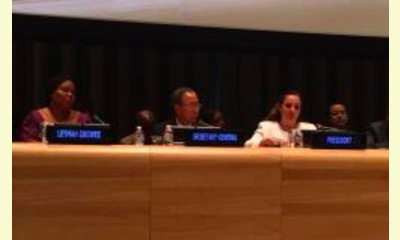|
|
Unarmed Civilian Protection Course Introduced At The UN
an article by Nonviolent Peace Force
The e-learning course on Strengthening Civilian Capacities to
Protect Civilians was introduced today [September 9] at the United Nations High Level Forum on Culture of
Peace in New York. The six module course developed jointly
by the UN Institute for Training and Research and Nonviolent
Peaceforce, will be available online in early 2015. 
H.E. Ms. Isabelle F. Picco Vice-President of the General Assembly (GA) welcomes the UCP e-learning course with UN Secretary General Ban Ki-moon and Nobel Peace Prize laureate Leymah Gbowee looking on.
click on photo to enlarge
H.E. Ms. Isabelle F. Picco Vice-President of the General Assembly
(GA) on behalf of H.E. Mr. John W. Ashe GA President highlighted
the course in her opening remarks:
"Indeed, the very essence of our United Nations is to promote and
work toward creating a culture of peace. The quest for peace is
reflected throughout our UN Charter and embodied in these words
of the preamble, which call on all of us to [quote] “practice
tolerance and live together in peace with one another as good
neighbours” [end quote]. The desire for peace drives this
organization and the work we do in nearly every programme, office
and department.
"In this respect, I welcome the initiative of UNITAR, in collaboration
with Nonviolent Peaceforce, to develop an online course called
Strengthening Civilian Capacities to Protect Civilians from Violence.
The course supports efforts for sustaining a global culture of peace
by engaging civil society and other relevant stakeholders in bringing
about peaceful settlement of violent conflicts and is designed to
foster intercultural dialogue, understanding and cooperation for
peace."
Individuals as well as organizations will be able to take this course
which will give students a thorough understanding of the principles,
methods and skills required for unarmed civilian protection.
|








|
DISCUSSION
Question(s) related to this article:
Can peace be guaranteed through nonviolent means?,
* * * * *
Latest reader comment:
We have the advantage of an independent evaluation of the Nonviolent Peaceforce initiative in the Philippines conducted by Swisspeace. The evaluation is very favorable, although in the end, as one reads through it, gets the impression that such initiatives can help but cannot bring peace by themselves.
Here is the executive summary:
Nonviolent Peaceforce in the Philippines can look back at more than two years of unique, relevant contributions and constructive engagement in one of the most difficult, political and volatile, contexts to work in: Being the only international non-governmental organization working with and living in close proximity to the most conflict-affected population in Mindanao, NP in the Philippines was able to support and enhance local structures of cease-fire monitoring, early warning, cross-community dialogues, human rights protection, to offer civilian protection and help to reduce the high levels of community violence.
The accepted offer to NP in the Philippines in late 2009 by the conflict parties GRP and the MILF to join the International Monitoring Team1 (IMT) and its Civilian Protection Component is a direct expression and result of its successful contributions to non-violence and violence reduction of the last two years.
To keep up the important work of NP’s project in the Philippines in the years to come, it is essential to ensure that the activities and objectives of NPP are based on a strategically and conceptually sound footing. This seems even more important given that NPP is going through a remarkable consolidation and expansion phase at the time of report-writing.
The re-focus on its key mandate, strengths and strategic advantages in Mindanao gives NP the opportunity to further enhance its unique work in the area of nonviolence, peacekeeping and peacebuilding.

|
|









